The South African government has initiated a review process that could allow Starlink, the satellite internet service owned by Elon Musk, to gain operational approval within the country. This development comes amidst a backdrop of diplomatic tensions, particularly highlighted by Musk's recent statements about the challenges of entering the South African market under the current ownership laws.
South Africa Moves Towards Starlink Approval Following Diplomatic Tensions

South Africa Moves Towards Starlink Approval Following Diplomatic Tensions
Regulatory changes may soon allow Elon Musk's satellite internet company to operate in South Africa without local ownership requirements.
Under South African legislation, foreign companies must offer partial ownership to historically disadvantaged groups, a policy aimed at addressing economic disparities resulting from apartheid. Musk has publicly criticized these requirements, describing them as discriminatory. His concerns intensified following a high-stakes meeting with U.S. and South African officials, where President Trump confronted President Cyril Ramaphosa over claims regarding violence against white farmers.
This regulatory shift signals a potential path for Musk's ventures in South Africa, which could enhance relations between the two nations. White House officials have suggested that American firms, including Musk's, should be exempt from such ownership laws as part of broader trade negotiations. With this prospective approval, it seems the South African government may be seeking to strengthen its economic ties with the United States while navigating its legacy of inequality.
As the review process unfolds, the implications for both local business environments and foreign investments in South Africa remain to be seen.
This regulatory shift signals a potential path for Musk's ventures in South Africa, which could enhance relations between the two nations. White House officials have suggested that American firms, including Musk's, should be exempt from such ownership laws as part of broader trade negotiations. With this prospective approval, it seems the South African government may be seeking to strengthen its economic ties with the United States while navigating its legacy of inequality.
As the review process unfolds, the implications for both local business environments and foreign investments in South Africa remain to be seen.





















